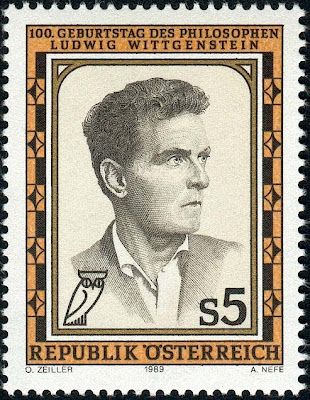And if that thing itself ends up being disappointing? All the more reason to try to return to the thing as you were imaging it beforehand. Obviously a space exists for it, the space that the thing you wanted to find defaulted on occupying.
 From Philosophical Investigations:
From Philosophical Investigations:
-
- If I say I did not dream last night, still I must know where to look for a dream; that is, the proposition ‘I dreamt’, applied to this actual situation, may be false, but mustn’t be senseless.”—Does that mean, then, that you did after all feel something, as it were the hint of a dream, which made you aware of the place which a dream would have occupied? Again: if I say “I have no pain in my arm”, does that mean that I have a shadow of the sensation of pain, which as it were indicates the place where the pain might be? In what sense does my present painless state contain the possibility of pain? If anyone says: “For the word ‘pain’ to have a meaning it is necessary that pain should be recognized as such when it occurs”—one can reply: “It is not more necessary than that the absence of pain should be recognized….
“An expectation is so made that whatever happens has to accord with it, or not.” Suppose you now ask: then are facts defined one way or the other by an expectation—that is, is it defined for whatever event may occur whether it fulfils the expectation or not? The answer has to be: “Yes, unless the expression of the expectation is indefinite; for example, contains a disjunction of different possibilities.” - What does man think for? What use is it?—Why does he make boilers according to calculations and not leave the thickness of their walls to chance? After all it is only a fact of experience that boilers do not explode so often if made according to these calculations. But just as having once been burnt he would do anything rather than put his hand into a fire, so he would do anything rather than not calculate for a boiler.—But as we are not interested in causes,—we shall say: human beings do in fact think: this, for instance, is how they proceed when they make a boiler.—Now, can’t a boiler produced in this way explode? Oh, yes.
- Does man think, then, because he has found that thinking pays?—Because he thinks it advantageous to think? (Does he bring his children up because he has found it pays?)
- What would shew why he thinks?
- And yet one can say that thinking has been found to pay. That there are fewer boiler explosions than formerly, now that we no longer go by feeling in deciding the thickness of the walls, but make such-and-such calculations instead. Or since each calculation done by one engineer got checked by a second one.
- So we do sometimes think because it has been found to pay.
- It often happens that we only become aware of the important facts, if we suppress the question “why?”; and then in the course of our investigations these facts lead us to an answer.
- The character of the belief in the uniformity of nature can perhaps be seen most clearly in the case in which we fear what we expect. Nothing could induce me to put my hand into a flame—although after all it is only in the past that I have burnt myself.
- The belief that fire will burn me is of the same kind as the fear that it will burn me.
* The reality: Wittgenstein’s writing was gathered like Pessoa’s Book of Disquiet from higgledy-piggledy fragments of annotated typescript, then edited and translated into English. Its meaning doesn’t leap out in sprightly vividness to the passing layman, but is worth a go anyhow.
- If I say I did not dream last night, still I must know where to look for a dream; that is, the proposition ‘I dreamt’, applied to this actual situation, may be false, but mustn’t be senseless.”—Does that mean, then, that you did after all feel something, as it were the hint of a dream, which made you aware of the place which a dream would have occupied? Again: if I say “I have no pain in my arm”, does that mean that I have a shadow of the sensation of pain, which as it were indicates the place where the pain might be? In what sense does my present painless state contain the possibility of pain? If anyone says: “For the word ‘pain’ to have a meaning it is necessary that pain should be recognized as such when it occurs”—one can reply: “It is not more necessary than that the absence of pain should be recognized….

Having written the above, I sat back & started to watch a YouTube video of Peterson with the sometimes clownish Russell Brand interviewing him, and he was saying that of course his lectures, like any, are “theatre” in which he has plenty of material to fall back on like a stand-up comic (which Russell Brand is known for too) but also they are occasions for him to think in real-time.
Which reminds me to add an important point about Wittgenstein, that he taught (Oxford or Cambridge, I don’t remember) in small tutorials in which his thought took place right there and then, if possible in dialogue with his students, if they were up for it; and were exhausting for him. He only wrote one book himself, knocking it out during service on the German side in WWI. It’s known as the Tractatus. All his other works are collected posthumously from notes: his or his students’.
Though I was an outsider hanging out with students in the Philosophy Dept, I felt it a great privilege to have come in contact with Peter Geach & his wife Elizabeth Anscombe, who had studied directly with Wittgenstein. It wasn’t an entirely positive thing. His students typically got infected with some of his mannerisms, I should say eccentricities.
His philosophizing leant upon a more-or-less immediate audience. Which is why we are here in this retreat
LikeLike
Peterson to Brand: “I’m here to think about complicated things in real time, with an audience there to participate.”
LikeLike
I’ve wanted to read Wittgenstein for a while now. What is that you like about his writing, Vincent?
LikeLike
I don’t know, Kengo. You could search for his name on Wayfarer’s Notes
LikeLike
Restoring this post today brings to mind that I was keen on Wittgenstein for many years, and got hold of his famous books, such as Zettel and the Blue & Brown books, as well as reminiscences from his friends and a first-half biography—the author died, are gave up, I don’t remember. I took against poor Ludwig and gave most of them to the Salvation Army.
Why? Because he philosophized for fun. His finding have no significance, and are too dry to be of interest
LikeLike